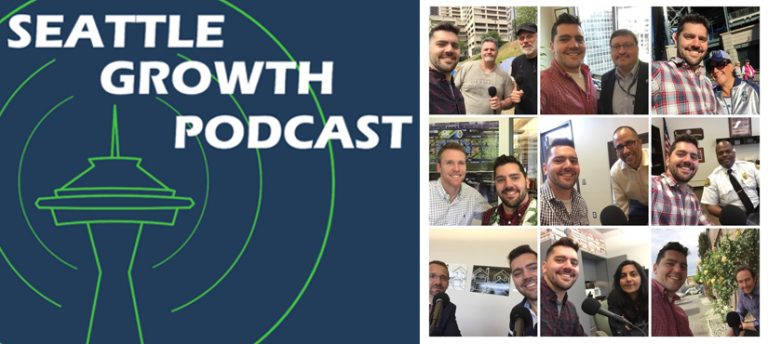Published on July 26, 2016

Jeff Shulman moved to Seattle a decade ago to begin his career at the University of Washington. In that short time, he’s watched Seattle’s dramatic and ongoing growth transform the city. This former South Lake Union resident has put together a thirteen-episode, in-depth look at how Seattle’s changes have affected real people. With nearly 100 interviews done to create the series, Shulman is looking forward to the July 26th launch of the Seattle Growth Podcast. We sat down with Jeff to see what it was like to make this podcast, and what we might take away from it.
Jeff Shulman is an associate professor and the Marion B. Ingersoll Professor in Marketing at the Foster School of Business at the University of Washington.
(This piece is part of an ongoing series of interviews Urban@UW is doing with urban researchers, designers, and thinkers.)
Urban: With so many platforms available, what motivated you to do a podcast? Is this your first one?
JS: It actually is my first. I figured there’s a growing number of people listening to podcasts, and I think it’s a media platform that will continue to grow. As we bounce back from the limitations of Twitter and changes in journalism generally, I think people are increasingly looking for quality, long-form presentations of ideas. Given the polarization around growth, I felt it was the right way to do this. You know, we all tend to share conversations with similarly minded people and as soon as someone really opposes your view, you tend to tune out. So, I wanted to tell a story without a slanted angle, a way to explore what these changes meant to people of all walks of life in Seattle.
Urban: You came to the city around 2006. Given the topics you’re covering, what have you observed since your move here? Did those observations catalyze the podcast?
JS: I moved here in 2006 and lived in South Lake Union. I moved out in 2012. The SLU I lived in is unrecognizable. When I go there now, almost every building near my old complex is new and that helped me realize I had only a ten-year history here to compare to. I was really curious how these changes were perceived by long-term residents—whether they were city officials or homeless people, how different this was from previous times of change and, really, I wanted to know how they felt about it.
Urban: As you pointed out there is some divisiveness on the topic of growth. How did you navigate this and what roadblocks came up?
JS: Very few, actually. People were eager to talk to me—I was welcomed into a number of homeless communities, city hall, Seattle Municipal Tower, and in artist communities. I think that by presenting the opportunity to be listened to, to be heard, really resonated with people. And more importantly I found that people were curious too; they wanted to know what other people were thinking and feeling.
Urban: Having met with so many different people, were there any commonalities that surprised you?
JS: There were a lot of little things along the way. A hot dog vendor and white-collar worker were excited about Seattle becoming a 24-hour city. A homeless person and tech worker both amazed at the number of opportunities they now had. There were some unique commonalities where you just wouldn’t expect people to share the same perceptions. But the biggest one that kept coming up was community. It didn’t really matter who I talked to, community came up a lot and the question was often whether growth was a problem or solution for the further development of community. People were really concerned and excited about what this might mean for their community and the city’s community at large.
Urban: Can you give an example?
JS: When I was talking to Tent City 7 residents, some were really anti-growth and two men told me about how they have money but when they walk around and look at stores or restaurants they can’t afford to buy anything. Growth just keeps putting things out of reach. When I told them that many in the tech community are excited about the growth they became really curious: they wanted to know what others were thinking and feeling. And this trans-group curiosity happened a lot. That was what really struck me. People in all communities, of all kinds, knew what was impacting them but they were all curious what it was like for other people. So while this is a divisive issue, the fact that community is the near-universal concern was really something to me. I think we share a lot, and while we all lead different lives, the fact is that Seattle’s culture understands community as being unilaterally important. I am excited to bring the diverse voices of the community together with hopes of finding common ground in addressing the key issues facing everyone in a growing city.
You can subscribe to and follow Jeff Shulman’s podcast on iTunes or the podcast website starting July 26, 2016.
Written by Andrew Prindle, Urban@UW Communications Coordinator